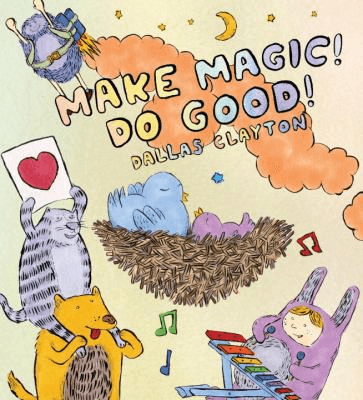If you would have asked me about a year ago, I probably would have told you I wasn’t a very creative person. Now I realize I was just working with the wrong definition, and making some pretty common mistakes.
My first mistake was conflating artistic talent and skill with creativity. I guess I always knew that art wasn’t the only way to be creative, but it’s hard to remember that when the two terms are used interchangeably all the time. After thinking about this more, I read Creative Confidence by Tom Kelley and David Kelley, a book that really drove the point home: Creative thinking isn’t just for “artistic types” — it has much more to do with taking time to generate ideas and try them out. The Kelley brothers’ book is really focused on creativity and innovation in the workplace, but the principles they cover can apply to many different aspects of life.

This brings me to my next point: My second mistake was thinking that people are either artistically talented or not. Certainly, talent is a factor, but artistic skills, like most other skills, are learned and cultivated. Exploring lots of different books (and I mean lots, the collection is almost endless) about art journaling, painting, collage, hand-lettering and other creative mediums has been a great way for me to dabble, see what I’m drawn to, and make time for a daily creative practice. It’s been great to let go of the idea that I need to be good at it, and just focus the fact that I enjoy doing it. Over time, I’ll probably build up my skills, but for now I am enjoying being an absolute beginner, and being an absolute beginner is way better than being on the sidelines.

Error number three was an amorphous feeling that creativity has to be channeled into a heartbreaking work of staggering genius. It doesn’t. Little bits of fun and frivolity are a great way to let your creative energies out. Dallas Clayton’s books and art always remind me of this concept; similarly, I recently read Oh Joy! and was struck by Joy Cho’s comment, “There’s almost always an opportunity to add a little whimsy to your life.”
My final oversight was forgetting to think about how all of this ties back to vulnerability (a topic I’ve written about on this blog previously). Henri Matisse was right: “Creativity takes courage.” Being creative is inherently tied to taking risks and making mistakes. The ability to learn from mistakes is tricky, because in the first place, you have to put yourself into a position to make mistakes. Isn’t it easier just to stick with things we’re already good at? Well, yeah, which is so many of us wind up feeling like we don’t have the capacity to be creative.
My non-expert advice? Get out there and create something — a doodle on notes you’re taking during a meeting, a concept for improving your community, a new way to put together that Lego set in the back of your closet. It’s all creativity and you totally have the ability to do it.
-Ginny
Find some inspiration
Explore books about creativityGinny is a baker of treats, reader of fiction and Coordinator of Volunteer Services based out of the Office of Programs and Partnerships at CLP – East Liberty. She wants to pet your dog.
